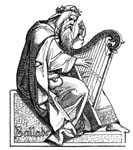
The Shrinking of Sacred Time
ANOTHER TRIUMPH FOR COMMERCE
The bishops of the ecclesiastical province in which I live have recently announced that from now on the Feast of the Ascension will be observed on the Sunday following the traditional date for that feast. The bishops presumably had good motives for this. As my own bishop wrote, “many of our Catholic faithful find it difficult to observe this important feast fully since they must work on Thursday and thus cannot bring to this day the appropriate relaxation of mind and body required for the keeping of a holy day.” He went on to say, “I believe that transferring the solemnity…will lead to a more fruitful and widespread observance of this important feast.” It was also pointed out that many other dioceses in the U.S., not to mention all the dioceses of Italy, have for some time observed Ascension Day on the following Sunday. It is a small adjustment, no doubt, a minor change in the life of Christ’s Church. Surely, we need not bother ourselves about it, and anyone who is disturbed by it is confusing the essentials of the Faith with mere accidentals.
Nevertheless, I protest, and protest vehemently against this decision. For it represents nothing else but the retreat of the Church, the abdication of her task of sanctifying human life, another triumph for commercial civilization, in fact, and the acquiescence of the Church in her own decline.
The Catholic Church was given the mission by God of bringing men to Heaven. But in doing so, she has never taken the position that our life on earth is a mere featureless background to the all-important struggle for the destiny of each human soul. Because man is a composite of soul and body, because we must work out our salvation as creatures with bodies who live in a material world and for whom material things (as in sacraments) are even made the vehicles for grace, because in Heaven itself our souls will be reunited with our bodies, the entire realm of matter and all that goes with it is not irrelevant to the Christian life. That is why the Church has always fostered beauty and has worked to establish a Christian social order. That is why, even in their decay, lands that were formed by the Faith, such as Europe or Latin America, still exhibit traces of a way of life in which mankind not only found the fullest happiness of which it was capable here below, but many helps for attaining the true happiness for which we hope above. Although it is true that “here we have no lasting city” (Heb. 13:14), still the Church has never hesitated to baptize and sanctify ordinary life as she baptizes and sanctifies ordinary men.
Because we live among finite and passing things, we also live in time. And like place and matter, time is one of the elements that characterizes our life and which needs to be sanctified by the Faith. And of course the Church has done exactly that. We have the Church Year with its seasons and feasts — feasts which have both a liturgical and a popular side to them, the latter dependent on the former, but both intended to give glory to God.
Now, by establishing a Church Year, by naming certain days as feast days or fast days, the Church is making a claim about time. She is claiming that the dimension of time in which man lives not only can be sanctified but rightfully belongs to God. Just as the salvation of our souls should be our most important concern, so the claims of the Church over time are more important than those of the state or any other human entity or organization. And where Catholics realize that the Church Year is not just something to be observed within the parish, where, for example, they refuse to mar the observance of Advent by a premature celebration of Christmas, and where they embellish saints’ days with popular festivities — there the true meaning of Catholic time can be seen.
You May Also Enjoy
Guaranteed Controversy... Man-Child in the Promised Land
The Ethics of the New Eugenics... Theo-Poetics: Hans Urs von Balthasar and the Risk of Art and Being
Review of Priestblock 25487: A Memoir of Dachau... Vatican II: A Sociological Analysis of Religious Change... Embryo Culture: Making Babies in the Twenty-First Century

